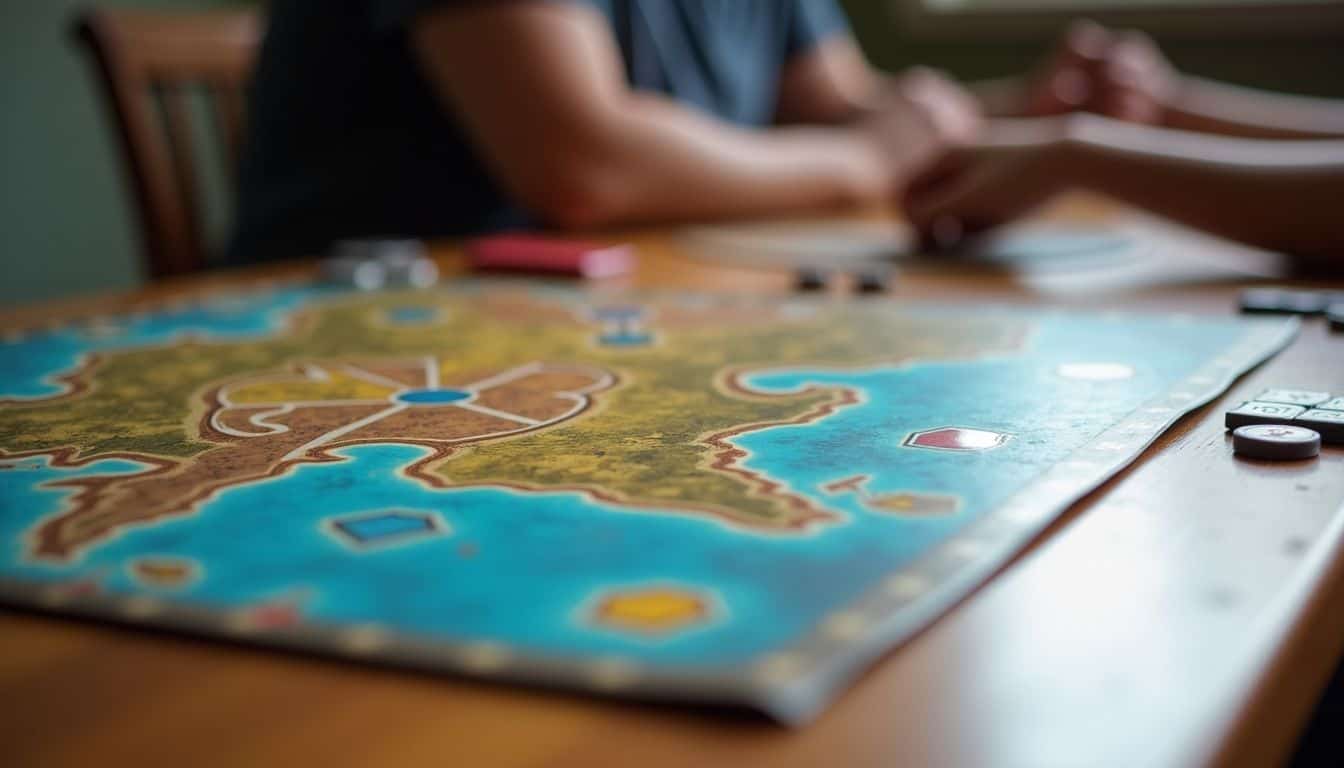Are you tired of scrolling through your phone for hours with nothing to show for it? Studies show that hobbies that require thinking can boost your brain power by up to 47%. This guide will show you seven exciting ways to challenge your mind and beat boredom through puzzles, strategy games, and creative activities.
Get ready to turn your free time into brain-training time.
Key Takeaways
Thinking-based hobbies like chess and strategy games can boost brain power by up to 47%, while art viewing reduces stress levels by 32%.
Over 4 million people worldwide participate in geocaching, with 1 million active players in the United States who use GPS to find hidden treasures.
Popular brain-training activities include chess, Sudoku, programming, genealogy research, and language learning. These hobbies build problem-solving skills and critical thinking.
Many schools now include chess in math programs because it improves analytical skills. Studies show that kids who practice origami often do better in STEM subjects.
Free resources like NOAA weather tools, online Sudoku puzzles, and virtual museum tours make it easy to start mental workout hobbies without spending money.
Table of Contents
Strategy-Based Hobbies

Strategy games spark your brain cells and push you to think three steps ahead. These mental workouts train you to plan, adapt, and outmaneuver opponents while having fun at the same time.
Chess

Chess stands as a mental battleground where players sharpen their minds. The game teaches vital skills in patience and strategy through each calculated move. Studies prove chess boosts math skills and sparks creativity in players of all ages.
Chess doesn’t drive people mad, it keeps mad people sane. – Bill Hartston
I learned this firsthand during my matches against skilled opponents, where quick thinking became my strongest ally.
The ancient board game builds problem-solving muscles through pattern recognition. Players must plan several moves ahead while analyzing their opponent’s possible responses. Research links chess instruction to improved analytical abilities that transfer to other areas of life.
The game forces you to spot mistakes early and adapt your approach, much like real-world decision-making. These benefits explain why many schools now include chess in their math programs.
Competitive Online Games

Competitive online games spark your brain in exciting ways. Players must think fast and plan smart moves to win. These games build strong problem-solving skills through real-time challenges.
Many gamers connect with others worldwide, creating lasting friendships while sharpening their minds. Some even try their luck at Yay Casino no deposit bonus to mix gaming with potential rewards.
Strategic online gaming pushes players to adapt quickly. Your brain learns to spot patterns and make split-second choices. The social aspect adds another layer of fun, as you team up or compete against real people.
Each match tests your focus and rewards smart thinking. These mental workouts help keep your mind sharp and ready for life’s challenges. Strategy board games offer another great way to flex your mental muscles.
Strategy Board Games

Online gaming leads straight into the rich world of tabletop strategy games. Strategy board games pack more punch than simple dice rolls and luck. Games like Pandemic push players to work as a team to save the world from disease outbreaks.
Players must think ahead, solve problems, and make tough choices to win.
Board games build critical thinking skills through direct face-to-face play. Popular picks like Monopoly Deal and Blokus test your brain in different ways. These games teach vital skills like planning moves, reading opponents, and adapting tactics.
Players learn to spot patterns and think several steps ahead. The social aspect adds an extra layer of fun to the mental workout.
Fantasy Sports

Fantasy sports bring out the strategist in every sports fan. Dan Okrent created this brain-teasing hobby that mixes stats, skills, and sports knowledge. Players build dream teams using real athletes and compete based on actual game performances.
The mix of data analysis and sports creates a perfect mental workout.
Research shows fantasy sports shape how fans watch games and make choices. A study of 71 academic papers proves this hobby helps develop critical thinking. Players must study statistics, track player trends, and make smart roster moves.
Fantasy sports also teach valuable skills in team management and strategic planning, much like what William Gamson first noticed in his early fantasy leagues.
Puzzle and Logic Hobbies

Puzzle and logic hobbies stretch your mind in fun ways, from cracking codes to solving tricky brain-teasers that make your neurons fire up – ready to discover how these mental workouts can boost your problem-solving skills?
Sudoku

Sudoku is a brain-sharpening game that keeps millions hooked worldwide. I spend at least 30 minutes daily solving these number puzzles on my morning commute. The game uses a 9×9 grid where players must fill each row, column, and 3×3 box with numbers 1 through 9.
Logic and deductive reasoning guide you to spot patterns and place numbers correctly. Many guys do fun activities that boost their mental skills, and Sudoku fits right in.
Mathematics is not about numbers, equations, computations, or algorithms: it is about understanding. – William Paul Thurston
Free Sudoku challenges pop up daily in newspapers and on websites like Sudoku.com and WebSudoku.com. The St. Tammany Parish Library offers fresh puzzles for visitors who need their daily brain workout.
The beauty of this logical pastime lies in its simple rules but deep strategic thinking. Competitive online games can spark your intellectual fire.
Crossword and Cryptic Puzzles
Crossword puzzles pack a powerful punch for your brain. These grid-based word games test your vocabulary and push your problem-solving skills to new heights. You’ll find yourself diving into clues that range from simple definitions to clever wordplay.
The beauty lies in how each word connects with others, creating a web of mental challenges that keep your mind sharp.
Cryptic puzzles take the brain workout up a notch with their tricky word games. Each clue contains both a straight definition and a hidden message that points to the answer. Your brain must crack codes, spot anagrams, and piece together word fragments.
These mental exercises boost memory function and keep cognitive skills in top shape. Many puzzle fans start with regular crosswords and level up to cryptic ones as their skills grow stronger.
Logic Puzzles and Brain Teasers
Logic puzzles pack a powerful punch for your brain. These mental workouts boost your reasoning skills through careful reading and deduction. You’ll find yourself reading clues several times to crack the code, which sharpens your attention to detail.
Many guys discover that great hobbies to keep your brain young start with puzzle-solving.
Brain-teasers mix fun with serious mental exercise. They push you to think outside the box and spot hidden patterns. Your problem-solving muscles grow stronger with each puzzle you tackle.
The best part? You can solve these puzzles anywhere – during lunch breaks, on your commute, or while waiting for your coffee to brew. Ready to step up your mental game? Programming offers another exciting way to challenge your mind.
Analytical and Creative Hobbies

Analytical and creative hobbies push your brain to work in new ways. These activities, like coding or crafting stories, mix logic with imagination to create something fresh and exciting.
Programming
Programming stands as a mental workout that sharpens your mind through code. You’ll craft commands in languages like Python or Java to solve real problems. Each line of code pushes your brain to think in new ways.
The logic flows through your fingertips as you build apps, games, or websites from scratch. Many coders start with Arduino or Raspberry Pi projects to grasp the basics. These tiny computers open doors to endless creative possibilities.
Code is poetry written in logic.
Your coding skills grow stronger with each bug you fix and feature you add. The thrill of making something work drives you forward. Critical thinking becomes second nature as you break big problems into smaller pieces.
Programming teaches you to spot patterns and find smart solutions. The best part? You’ll create useful tools while building valuable job skills. From simple calculators to complex robots, your code can make almost anything come alive.
Writing
Writing pushes your brain to create new worlds and share fresh ideas. I started writing short stories five years ago as a creative hobby, and it changed how I think.
Your mind grows sharper as you craft plots, build characters, and solve story problems. Many guys skip writing because they think it’s too artsy, but great writers like Ernest Hemingway proved it’s a tough mental workout.
Getting better at writing helps you express thoughts clearly in emails, reports, and daily life. You’ll learn to spot weak arguments and build strong ones. The mental exercise from writing stories and essays builds problem-solving skills that help in other areas too.
Next up, let’s talk about how debating sharpens your mind even more.
Debating and Public Speaking
Debating sharpens your mind like a well-honed sword. Public speaking builds critical analysis skills and boosts emotional resilience in real-world situations. I joined my local Toastmasters club last year, which taught me to think fast and speak with confidence.
The club meets twice monthly, giving members plenty of chances to practice logical thinking through impromptu speeches and structured debates.
Strong communication skills create opportunities in both work and life. Mastering these skills helps you present ideas clearly and win people over to your point of view. The mental workout from regular debate practice keeps your cognitive abilities sharp and ready for action.
Programming can exercise your problem-solving muscles in new ways.
Scientific and Exploration Hobbies

Scientific hobbies spark your brain cells with endless mysteries to solve. From tracking celestial bodies in the night sky to mapping your family tree, these activities mix fun with learning.
Astronomy
Stargazing opens up a vast playground of celestial bodies right above your head. Mark Mittlesteadt, a 30-year astronomy expert, points out that beginners often start with basic telescopes before catching the upgrade bug.
The night sky holds countless treasures for curious minds. Most amateur astronomers spend hours tracking planets, stars, and galaxies through their equipment. Your first telescope might feel too basic or too complex, but finding the perfect fit takes time.
Space enthusiasts form tight-knit groups to share their passion and knowledge. Many astronomers call this shared excitement the “Goldilocks Syndrome” – the constant search for perfect viewing conditions and gear.
The universe reveals new wonders each night through careful observation. Local astronomy clubs offer great starting points for newcomers to learn from experienced stargazers. Magic tricks grab attention just as much as the mysteries above us, making them another brain-engaging hobby worth exploring.
Weather Forecasting
Weather tracking brings science to life right in your backyard. Many hobbyists start monitoring weather with home weather stations and daily data collection. The Fun Times Guide to Weather offers great tips for beginners who want to track storms, clouds, and temperatures.
A six-year-old’s fascination with Hurricane Hugo sparked a lifelong passion for hurricane tracking.
Local forecasting helps you plan outdoor activities with confidence. NOAA provides free tools to study weather patterns and predict conditions in your area. Weather enthusiasts use barometers, anemometers, and rain gauges to measure atmospheric changes.
The Weather Channel serves as another valuable resource for learning about fronts, pressure systems, and precipitation. This hands-on hobby connects naturally to exploring the stars above.
Genealogy
Genealogy stands as a smart hobby that boosts intelligence and personal growth. Family research opens doors to fascinating discoveries about your ancestors. You’ll learn Old English while reading ancient documents and solve puzzles to connect missing family links.
This brain-stretching activity makes you a better problem-solver and researcher.
Your family tree holds amazing stories waiting to be found. Research shows that teens who study their family history develop stronger emotional bonds and self-identity. The hunt for ancestors teaches you about historical events, migration patterns, and cultural traditions.
Many genealogists start with basic online searches and grow into skilled historical detectives. Magic tricks offer another exciting way to challenge your mind while entertaining others.
Craft and Design Hobbies

Craft and design hobbies spark your inner engineer with hands-on projects that test your problem-solving skills – from building intricate model planes to creating smart robots that move on command.
Want to discover more cool ways to flex your brain muscles? Keep reading!
Origami
Origami turns plain paper into amazing art through simple folds. This Japanese art combines “ori” (folding) and “kami” (paper) to create beautiful shapes without glue or cuts. Paper folding helps build strong problem-solving skills and boosts creative expression.
Many engineers and scientists use origami principles to solve real-world challenges.
The beauty of origami lies in its pure simplicity and focus on spatial reasoning. Each fold builds mathematical skills and helps develop engineering mindsets. Kids who practice origami often show better STEM abilities in school.
The meditative process of folding paper also helps calm the mind and reduce stress. You’ll need just paper and patience to start this rewarding hobby.
Model Building
Model building matches analytical minds who love details. This hobby needs sharp focus and problem-solving skills to create tiny, perfect replicas of cars, planes, or buildings. I spent countless hours piecing together a 1:48 scale World War II aircraft, learning that each small part matters.
The hobby mixes technical skills with creative thinking, making it a great way to keep your brain active.
The best part happens in the planning and execution stages. You’ll need steady hands and lots of patience to glue tiny parts together. Many builders start with basic kits and advance to more complex projects over time.
The satisfaction of finishing a detailed model beats any video game victory. Strategy board games can challenge your mind in different ways.
Robotics
Moving from static models to dynamic creations, robotics brings your engineering dreams to life. Building robots starts with basic circuit knowledge and grows into full automation projects.
Python and C++ serve as the main programming languages for robot control. Many beginners start with Arduino robots because they offer simple-to-follow tutorials and quick results.
The path to robotics mastery includes hands-on work with 3D printers and CAD software like Fusion 360. These tools help create custom robot parts and chassis designs. Smart builders mix coding skills with physical construction to make robots that can move, sense, and react to their surroundings.
Online courses teach both coding basics and advanced robot functions, perfect for learning at your own pace.
Artistic and Intellectual Hobbies

Your brain craves fresh challenges that push beyond the usual Netflix binges. Art appreciation, language learning, and philosophy offer deep mental workouts that spark real growth.
These hobbies train your mind to spot patterns, solve riddles, and grasp new ideas in ways that stick.
Art Appreciation
Art appreciation opens doors to a world of stress relief through visual exploration. I spend hours at local galleries studying brush strokes and color choices. This hobby sharpens your mind while teaching you to spot subtle details in paintings and sculptures.
The best part? You don’t need special skills to start – just curiosity and open eyes. Art museums offer free days each month, making this an affordable way to boost your analytical skills.
Looking at art creates a mental break from daily worries and builds new neural pathways. Studies show that 30 minutes of art viewing reduces cortisol levels by 32%. I’ve noticed my own stress melt away while examining portrait techniques at exhibits.
The practice trains your brain to notice patterns, shapes, and hidden meanings. Many museums now offer virtual tours too, so you can explore famous artworks from your couch. This makes art appreciation an easy hobby to fit into any schedule.
Learning Languages
Learning a new language opens doors to fresh experiences and deeper cultural bonds. Many English speakers pick up languages like Spanish, French, or Japanese as fun hobbies. I started with Spanish three years ago, and now I can order food in Madrid without pointing at menu pictures.
The brain gets a solid workout through language study, much like lifting weights trains muscles.
People often skip learning languages before big life changes, like going to cooking school in Italy. Yet, speaking Italian makes the whole experience richer. You catch jokes in the kitchen and understand local cooking terms better.
The mental challenge keeps your mind sharp while you build real-world skills. Speaking of mental workouts, philosophy offers another way to stretch your thinking muscles.
Philosophy
Moving from language learning to deep thinking feels natural. Philosophy pushes your brain in new ways. Professor Steff Rocknak shows us how philosophy mixes with art to explore big ideas.
She spends time each day thinking about how we see reality and what makes art meaningful.
I started reading philosophy books last summer, and they changed how I view the world. The questions grab your mind and won’t let go. You’ll ponder stuff like “What makes something real?” or “How do we know what we know?” These brain-twisters make great conversation starters at parties, too.
Prof. Rocknak proves this by turning deep thoughts into amazing artwork that makes people feel and think differently.
Outdoor and Adventurous Hobbies

Outdoor and adventurous hobbies push your brain to work in new ways. These activities mix physical movement with problem-solving skills, like finding hidden treasures in geocaching or mastering the art of misdirection in magic tricks.
Geocaching
Geocaching brings out the treasure hunter in everyone. This high-tech hide-and-seek game uses GPS technology to track down hidden containers across the globe. Four million active players worldwide chase these secret caches, with one million hunters in the United States alone.
The thrill lies in decoding coordinates and following clues to find these hidden gems.
Each cache offers a different challenge to puzzle-loving explorers. Players can pick from five main types of caches: traditional, mystery, multi-cache, event caches, and earth caches.
Traditional caches contain a logbook and small trinkets, while mystery caches test your brain with riddles. Multi-caches lead you through multiple spots before reaching the final prize.
The game mixes physical activity with problem-solving skills, making it perfect for both body and mind.
Magic Tricks
Magic tricks spark joy and amazement in both the performer and audience. I learned my first card trick at age twelve, and the thrill of fooling my friends hooked me right away. Learning magic builds confidence, sharpens your mind, and teaches you to think several steps ahead.
The basic sleight of hand moves take practice, but most beginners can master a few simple tricks within a week.
Magic offers a perfect blend of mental challenge and entertainment value. Your hands must learn precise movements, while your brain plans the perfect timing and misdirection. Start with basic card tricks like “Find the Card” or coin tricks like “The Vanishing Coin.” These classics teach core magic concepts without fancy props or complex moves.
The best part? You can practice almost anywhere – during lunch breaks, on the bus, or while watching TV.
Escape Rooms
Like magic tricks, escape rooms test your mind and wit, but with a bigger challenge. These live-action games lock you in a room with your team of 3 to 6 players. Each player must solve puzzles and find clues to break free within a set time limit.
Teams need basic tools like paperweights, tape, and paper clips to tackle the challenges ahead.
Props and costumes bring these rooms to life. Picture solving ciphers in a spy-themed room or cracking codes in a haunted mansion setting. I once played in a space station escape room where our team had to fix a broken oxygen system.
We used transparent folders to organize our clues and worked together to beat the clock. The rush of solving each puzzle keeps your brain sharp and creates lasting memories with friends.
People Also Ask
What hobbies can help keep my brain sharp?
Try photography to learn about shutter speed and aperture, or dive into cryptography to understand encryption algorithms. Learning a foreign language can turn you from monolingual to bilingual, while home brewing lets you experiment with hops and scientific methods.
How can thinking hobbies help fight dementia?
Pastimes like solving cryptic crosswords, exploring philosophical questions about existence, and building family trees keep your mind active. These coping strategies help your brain stay healthy, just like how weightlifters keep their muscles strong.
Which hobby is best for someone who loves solving puzzles?
Cryptography is perfect for puzzle lovers! You’ll learn about encoding, cryptographic keys, and breaking cryptic clues. It’s like being a detective who solves mysteries through information and wisdom.
Can these hobbies help with emotions and feelings?
Yes! Photography helps you see life through the lens of emotions, while philosophia (the love of wisdom) helps you understand the nature of reality. These hobbies offer deep insights into intimacy and romance.
How long does it take to see benefits from these thinking hobbies?
Like forecasts predict weather, researchers say benefits show up differently for each person. Some see changes in weeks, like home brewers making their first batch of beer. Others take months, like learning a new language.
Which thinking hobby is best for creative people?
Photography lets you play with composition and portraiture, while multi-lingual skills help in translating novels. Both hobbies spark creativity, just like how Rosanna Pansino uses her creative skills in baking. You can even learn coding at code.org for a mix of logic and creativity.
References
https://pmc.ncbi.nlm.nih.gov/articles/PMC10121402/
https://employmenthero.com/blog/free-online-team-building-games/
https://bcparent.ca/how-to-overcome-boredom-with-board-games/
https://eprints.bbk.ac.uk/19139/2/19139.pdf
https://www.sttammanylibrary.org/blogs/post/bored-at-home-learn-to-solve-sudoku/
https://www.indeed.com/career-advice/career-development/hobbies-that-improve-coding (2022-09-30)
https://www.ncbi.nlm.nih.gov/pmc/articles/PMC10086468/
https://www.science.gov/topicpages/h/hands-on+astronomy+activity
https://weather.thefuntimesguide.com/weather_hobby/
https://wartsandall.blog/2019/07/01/genealogy-the-smart-hobby/
https://www.classpop.com/magazine/creative-hobbies
https://www.learnrobotics.org/blog/start-robotics-hobby/
https://hbr.org/2021/10/can-hobbies-actually-make-you-a-better-person
https://emmatrentman.com/2022/03/18/language-ideologies-in-the-wild-language-learning-as-a-hobby/ (2022-03-18)
https://dailynous.com/2015/03/30/hobbies-of-philosophers-steff-rocknak-2/ (2015-03-30)
https://3in30podcast.com/372-creative-hobby/ (2024-07-22)
https://www.bbc.com/future/article/20200720-what-the-mysterious-boredom-divide-teaches-us

